All good things must come to an end (and bad things too), so when it’s time to leave a job, you need to write a thoughtful and professional resignation letter that hits all the right notes and doesn’t strike any sour chords. This is a time of reflection about the past and hope for the future, but you cannot close the door fully until you have tied up all the loose ends.
You might be tempted to leave a job like Steven Slater, the JetBlue flight attendant who in 2010 delivered a profanity-riddled “I’m done” over the intercom, grabbed two beers, deployed an emergency slide and vanished as suddenly as his future job prospects.
However, unless you want to become a permanently unemployable media sensation, you’ll probably want to find a more graceful exit strategy. And that means that, among other considerations, you’ll need to write a professional letter of resignation that serves as formal notification of your departure. This will be kept on your employment record, so don't spoil your record by sharing any inappropriate comments.
This article will explore why a good resignation letter is important and how to write it, along with other sound counsel to help you reach your next destination without burning any bridges behind you.
This resignation letter guide and its corresponding free examples will:
- Explain why you need a good resignation letter when leaving or switching careers
- Show an effective resignation letter structure and elements
- Provide a template for a resignation letter that you can adapt for your needs
- Share writing samples for each part of the resignation letter
- Detail the correct format and formatting for a resignation letter
- Consider nine different categories of notice letter

Why do you need to send a resignation letter?
The main reason you need to write a resignation letter is that in some workplaces, a resignation letter is an official document with legal implications. You may be contractually required to give two weeks’ notice, and your formal resignation letter will serve as proof that you have done so. This will protect you in case of disputes and serve as a tool to safeguard your rights if a more serious situation arises. Basically, this is good “professional hygiene” that helps you avoid sticky situations.
The second purpose of a resignation letter is connected to your professional reputation: The notice letter is an instrument for smoothly changing jobs, shifting careers and remaining in good standing within your industry. Before resigning your job, hopefully you have another one lined up. But just in case that job doesn’t last forever, you’ll probably need another letter of resignation after that. And future employers may insist on calling your previous employers for references, whether you want them to or not. You may also want to ask your boss for a letter of recommendation that you can use in the future.
So even if you hate your current job, you should leave on the best terms possible. Your professional reputation may seem like an irrelevant idea — until you get a bad one. After that, it becomes only too real. Even in seemingly trivial jobs, people are often surprised how difficult it is to “wash away” the stain of one bad job exit. That means it’s a bad idea to tell your boss to go take a flying leap in your resignation letter if you want to remain in good standing within your profession. Your boss may not be happy about you leaving, so don't give them the opportunity of being critical about you if your resignation letter contains any hint of bitterness or malice.
You may be due vacation pay, severance pay or health and retirement benefits. You may need a friendly HR professional to explain your options — for example, how to roll over your retirement benefits or extend your health insurance. Do you REALLY want to tell your employer to go jump in the lake in your letter of resignation, and then expect the company’s friendly cooperation in easing you out the door? Be friendly and professional - you should remember that this happens all the time - resigning is a business transaction, after all.
Even if you’ve been treated horribly at your current job, swallow your resentment, behave like a stand-up professional and leave on good terms. Have a look at our resignation letter templates. In the long run, you’ll be glad you did.
What is the best excuse to resign? Let's be frank, you do not need an excuse. You are an adult, who has been working in return for a wage from your employer. You might feel bad at leaving, but much as you might feel emotionally attached and obligated to certain co-workers, you do not have to come up with some convoluted justification in a resignation letter. You have your reasons, for sure, but do not feel that you have to share them. In actual fact, it may be best not to share the reasons at all. Clean breaks are best for everyone concerned. Our resignation letter examples showcase the variety of excuses.
Basic resignation letter
Before we dive into the details of how this document should be written, let’s look at a basic resignation letter that hits the right notes:
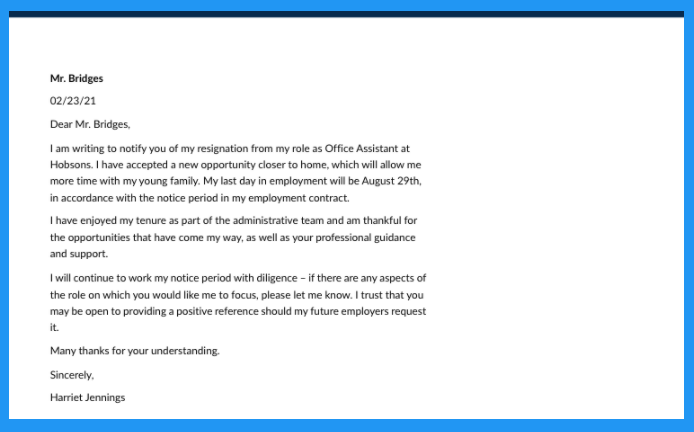
Resignation letter template
The following resignation letter template can be copied and adapted for your own use. Just insert your own text, details and reasoning. Hover over the text, click on “Copy to clipboard,” and then open a new document in Microsoft Word or any text editor and paste the text.
YOUR NAME
Address, City, State/Province, ZIP/Postal Code
Phone Number • Email
Supervisor’s Name
Supervisor’s Title
Company Name
Address
City, State/Province
ZIP/Postal Code
Today’s Date
Dear (SUPERVISOR’S NAME):
With regrets, I will be departing from my role as [JOB TITLE] at [COMPANY NAME] in two weeks. My last day of work will be [MONTH, DAY, YEAR].
Although I’ve been very happy working at [COMPANY NAME] for [XX] years, I will be leaving in order to [REASON FOR DEPARTURE].
Working for [COMPANY NAME] has been an honor and a pleasure. I’ve learned so much, and I’ve formed friendships with my outstanding colleagues that I will always value deeply.
I’d be more than happy to do anything I can to train my replacement, should you find one before my departure. Thank you so much for having given me the golden opportunity to work at [COMPANY NAME].
Sincerely,
[YOUR NAME]
Download here: Resignation letter template document.
Resignation letter format and structure
Here are the basic structural elements of a resignation letter:
- Header with your name and contact information
- Recipient’s name, company and address
- Date
- Salutation / greeting
- First paragraph: News of your resignation
- Second paragraph: Expression of gratitude for your time with the company
- Third paragraph: Expression of willingness to help with a transition
- Optional: Your reasons for departure
- Sign-off
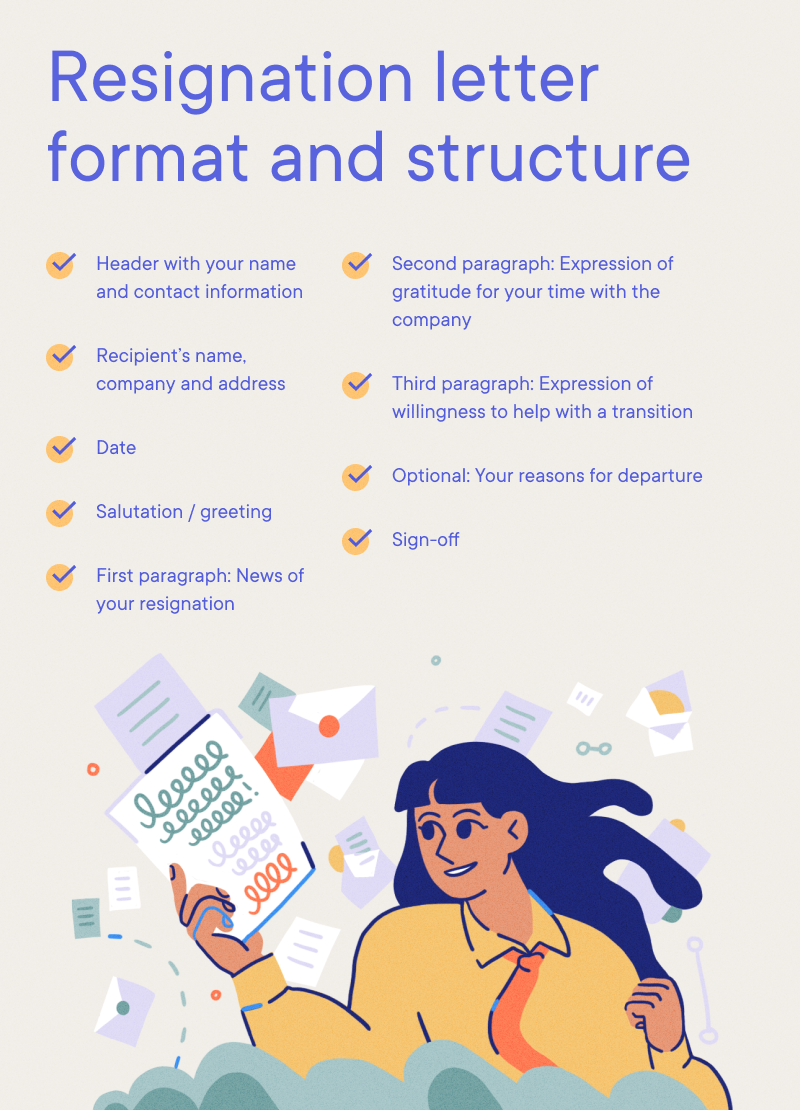
Follow proper business letter format in writing your resignation letter — just as if you were writing a cover letter seeking a new job. Use an attractive header with your personal contact info, include the recipient’s name, company and address, and include the date.
Use an easy-to-read font in a legible font size, no larger than 12 points and no smaller than 10. Text should be aligned left, not justified margin-to-margin. The gaps in the letters that this creates can create a cognitive dissonance that is hard to shake when a hiring manager is scanning your resume in an interview.
Paragraphs should not be indented, and they should have a space between them. Include a margin of at least one inch on the left, right, top and bottom.
Because a letter of resignation is typically short, you may find that the bottom half of your page is blank. If so, you can choose larger margins or add a bit more white space between elements on the page. Strive for a page that’s visually balanced, but don't feel that you need to fill the page with your emotional goodbyes.
Let’s analyze each of the structural resignation letter elements step-by-step below.
Header
The header at the top of the resignation letter (the same thing as a letterhead) should include your name, address, phone number and email.
You may already have a header prepared for resumes or cover letters that you’ve used in job searches, and the main purpose is the same: so the resignation letter recipient knows how to contact you if necessary.
It’s best to use a personal phone number and email address, since your company phone and email will probably be disabled soon. Bear in mind that this letter may be stored for years, and that the company may need to contact you in the future with information that’s important to you.
Recipient
In a flush-left block under the resignation letter header, type the name and title of your supervisor, plus the company name and address, as if you were addressing an envelope to be sent through the mails. You may also want to include the recipient’s email and phone number.
This makes it clear that you delivered this letter of resignation to the appropriate person. And if any questions arise in the future about your departure, it makes it easy to contact the person to whom the letter was delivered.
Date
Below the recipient’s name and address, add a space and write down today’s date — or the month, date and year that you will deliver or send the letter of resignation.
Although this is usually considered unnecessary in electronic communication, which is automatically dated, the date you gave notice could become a legal or contractual issue, so it’s best to spell this out.
Salutation
Formal resignation letters call for the traditional salutation / greeting: a “Dear Mr.” or “Dear Ms. / Mrs.” followed by the recipient’s last name. But assuming you’re on a first-name basis with your boss, there’s no harm in using his or her first name.
Is a two-week notice 10 or 14 days? Normally a two-week notice will be ten working days from the date of resignation or fourteen calendar days. Before you consider handling in your resignation letter, it is always worth checking your contract of employment. These details will definitely be included, amongst others that you may well wish to bear in mind. Read your contract carefully to see how your company handles departing employees.

Example of the first paragraph of a resignation letter
Without being rude, the opening paragraph of your notice letter can be somewhat blunt: You will be leaving X position at Y Company effective Z date.
In other words, you don’t need to bury the news. But you may want to soften it a bit with some kind words. You may not think that your boss will read it, but you never know. They may remember your time with them more fondly than you think.
Here’s a good example of a resignation letter’s first paragraph:
Dear Marjorie,
After eight happy years at this excellent company, I regret to inform you that I will be leaving my job as an electrical engineer at Acme Gizmos in two weeks. My last day will be Friday, Sept. 24, 2021.

Note that it’s not necessary to express any regret, or to praise the company you’re leaving. But there are ways to soften the blow of what may be troubling news to your supervisor. You know your situation (and your boss) better than anyone, and if you want to leave on a good note, it’s worth putting some thought into how to do so.
Many letters of resignation say the employee will be leaving “effective” such and such a date, but there may be some question about whether that will be your last day of employment or the first day you don’t plan to show up again. It’s best to be clear about this in a resignation letter — after all, the company may want to throw you a little party, and it would be a shame if they planned the party one day too late. Check the small print of your contract.
Example of the second paragraph of a resignation letter
In the second paragraph of a resignation letter, it’s customary to express gratitude for the opportunity to have worked for this company. You may want to mention how much you’ve learned, what a pleasure it’s been to work here, or how much you’ll genuinely miss this job. Steer clear of negative emotions and focus on how your career has progressed.
Here’s an example of how to soften the blow of your departure in your notice letter:
In many ways, this has been the best job of my life, and I’m so grateful that you took me on at a time when I had little experience in this field. I will never forget the pleasure of working in such a cooperative atmosphere with such superb colleagues.
Of course, it’s also possible that you’re leaving because it’s a terrible company and the job sucks and you hated it. And if so, your boss probably already knows how you really feel. Still, without trying to polish a turd, it’s best to exit on a positive note in a letter of resignation. Here’s another example of a positive note to include in your resignation letter to leave on good terms with the employer:
Thanks so much for the opportunity to work at Acme, and I wish the company and my hard-working colleagues all the best.
Third paragraph
You may wish to write more than three paragraphs, especially if you want to emphasize that you had a really positive experience at the company. This should not be hard to do in this case, and it is a nice way of bookending your career journey. Give your ex-boss a warm and fuzzy feeling when they read it.
But a letter of resignation should not exceed one page. And in the final paragraph you should express your willingness to help with any transition issues, train your replacement or otherwise ease the impact of your departure.
Here’s a sample closing paragraph for a resignation letter:
I’d be more than happy to help train anyone who may be replacing me, or to do anything else I can to help with a smooth transition. Please contact me anytime with any issues, and again, thanks for eight great years with this company.
Sign-off
Say your farewell with a simple “Sincerely,” “Cordially,” “All my best” or the like, and add your typed name at the bottom. If you’re going to deliver a hard copy of the letter, sign it in the space above your typed name.
For further guidance, feel free to click on this YouTube video about how to write a resignation letter.
Best resignation letters
Before we explore the different categories of resignation letters, it is important to understand that there is no such thing as a "best resignation letter." The content will depend on the situation, your relationship with your boss and the nature of the company culture.
It is preferable to tie up loose ends before writing the formal resignation letter, but if you are resigning out of the blue then this may not always be possible. Use the letter to address any outstanding issues as well as formally ending your employment. This will document your concerns and the company will have a responsibility to address them.
Think carefully about the scenario that applies to you and adapt the letter of resignation accordingly.
Resignation letter categories
Let’s consider some of the resignation letter categories that apply to various scenarios. Here are some of the types of resignation letter you might need:
- Simple two weeks’ notice resignation letter
- Professional resignation letter
- Formal resignation letter
- Resignation letter for a job you just started
- Short resignation letter
- Immediate resignation email
- Resignation letter when leaving on bad terms
- Resignation letter for unsatisfactory working conditions
- Negative resignation letter (this is one to avoid)
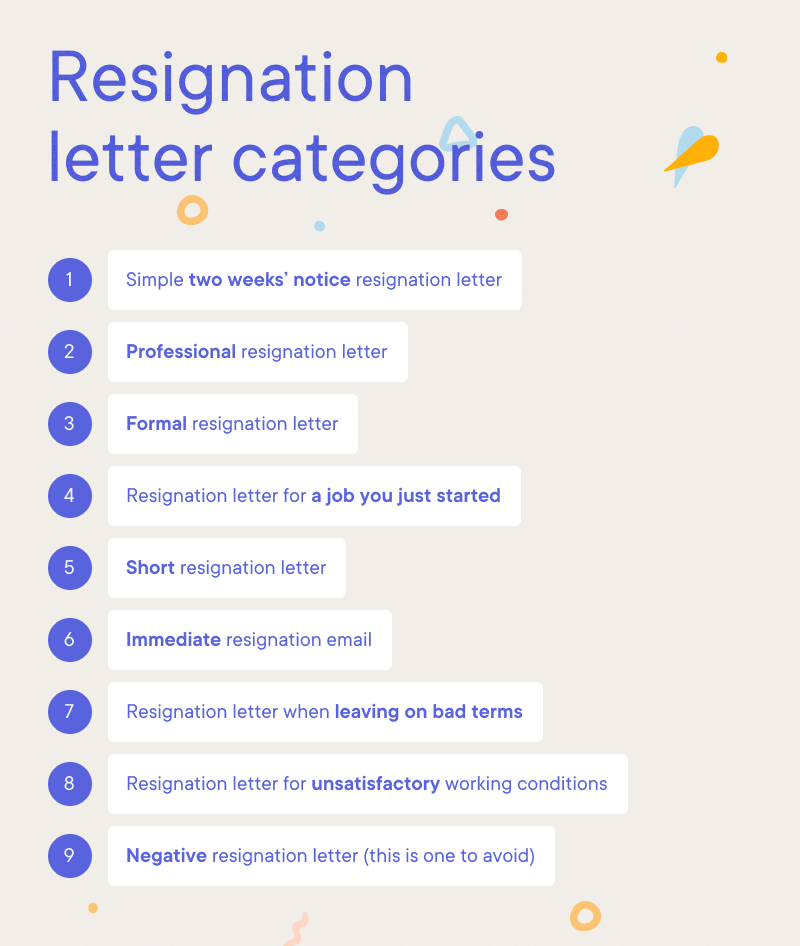
Let’s break down and analyze each one below, along with examples of these letters of notice.
Simple two weeks’ notice resignation letter
A two weeks’ notice resignation letter is standard practice, and these should generally be kept simple and to the point. There is no need to go into a lot of detail about the reasons for your departure, or to offer effusive thanks for all the opportunities extended to you as you review your long career with the company. There is no requirement to share any more than this basic outline.
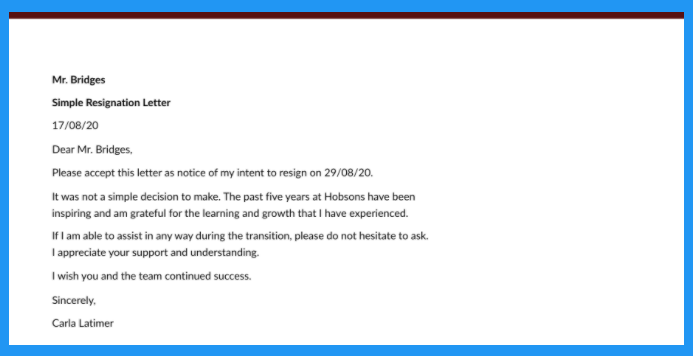
Here’s another simple/personal resignation letter example:
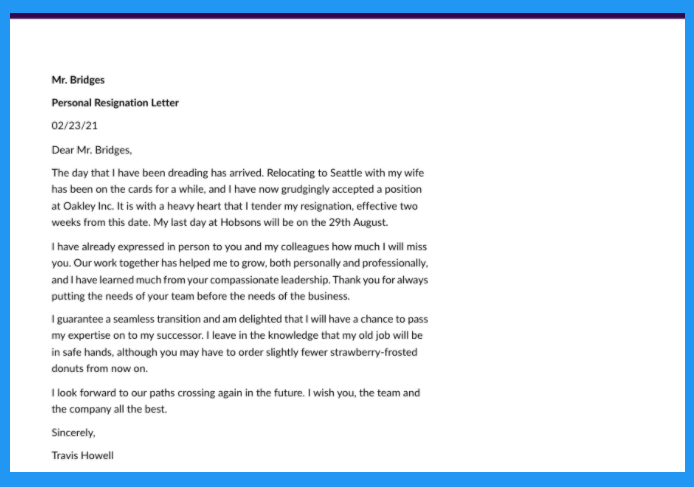
You don’t owe anyone an explanation about whether you’re contemplating a career change or pursuing a new opportunity with a competing company. You don’t even have to thank your employer, though you should always be professional and courteous.
In some cases, for whatever reason, you may wish to deliver a stark and simple resignation letter that merely informs an employer of your pending departure. Here’s an example of a very concise and to-the-point resignation letter:
Dear Mr. Anderson:
Please consider this letter two weeks’ notice that I plan to leave my position as a paralegal at Anderson & Sons. My last day will be March 8.
Sincerely,
Pauline Winston
Professional resignation letter
You may be good friends with your boss, and you may be leaving the company on great terms, but a resignation letter is not the appropriate place to be too informal or chatty.
A resignation letter should be written in a professional and straightforward style. If you want to reminisce about the great times you’ve had working with your buddies, you might want to save those thoughts for a separate goodbye email.
On the other hand, even if you despise your boss and you’re leaving the company with a long list of grievances, a letter of resignation is not the place to air them. Leave out the thanks if you wish, but maintain a professional tone and use this letter strictly to inform the company that you are departing.
Professional resignation letter:
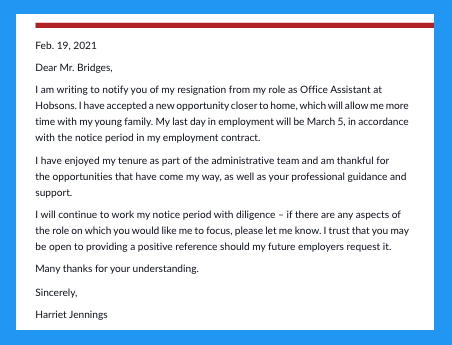
Formal resignation letter
There is little real distinction between a “formal resignation letter” and any other resignation letter. This is a formal document that may have contractual and legal implications, and it should follow a formal, professional format, structure and style.
The advice and examples appropriate for a professional resignation letter will be relevant for a formal resignation letter in nearly every imaginable scenario:
- Make sure to keep a level-headed and reasonable tone
- Avoid placing blame
- Offer support during the transition period
- Follow proper resignation letter structure
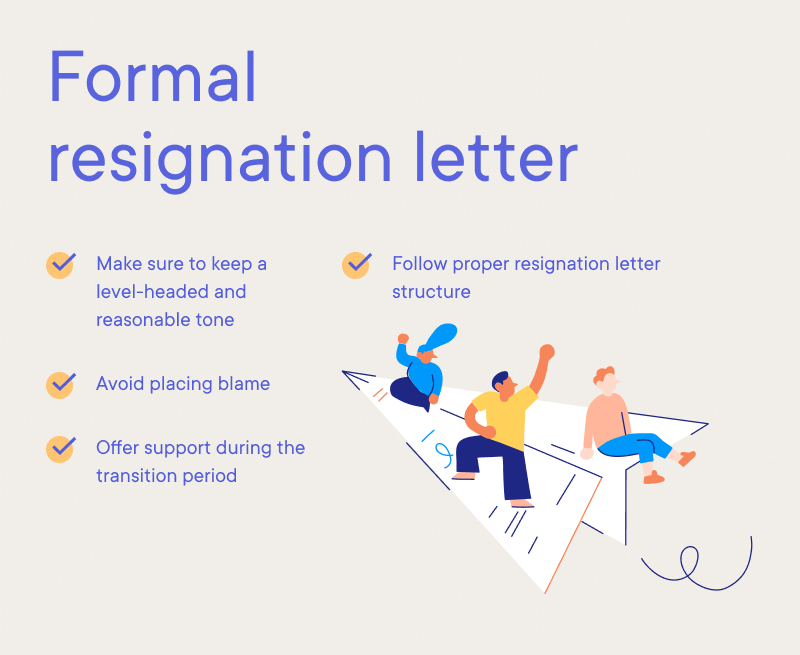
Resignation letter for a job you just started
You’ll find yourself in an awkward position if for some reason you’re obligated to write a resignation letter for a job you just started.
But it happens. During your recent job search, you may have contacted dozens of potential employers, and you may have felt that you had to take the first job you were offered. Then, in a stroke of good luck but bad timing, a much better job offer rolled in.
Family or health emergencies may also force you to abandon a new job. Or you may have discovered upon starting work that this job is just not for you, and that accepting it was a mistake.
In rare cases, the employer may have misrepresented the nature of the job — for example, you expected to be answering phones, but now it turns out you’re expected to clean the bathrooms too! Or you may find yourself in a toxic workplace where sexual harassment or psychological abuse comes with the job. In such cases, you need to have a frank conversation with your employer explaining why you’re leaving, and then write a very short resignation letter that simply gives notice and provides your departure date.
But if you’re leaving for reasons of your own, through no fault of the employer’s, you probably owe your boss some kind of explanation. Any employer would be understandably annoyed if you’re jumping ship after you just got on board. You need to approach your supervisor in person and delicately explain what has happened. Then you should follow up with a resignation letter that’s perhaps a bit contrite.
Here’s an example of a resignation letter for a job you just started:
Dear Ms. Brown,
I’m so sorry to inform you that because of the circumstances we discussed in person, I feel obligated to leave the company immediately.
I am genuinely sorry to leave you in the lurch like this, after your staff has been so professional and welcoming toward me in this new role. I expected to remain at this job for years to come, little anticipating this unforeseen complication in my life.
Please accept my apologies for my abrupt departure. Thank you so much for offering me this excellent opportunity, which I now feel obliged to decline with great regret.
Respectfully,
Joan Madison
Short letter of resignation
At times the circumstances may call for a short letter of resignation, without all the gratitude, regrets, reasons for leaving or other niceties.
This may occur if you are leaving a job under unpleasant circumstances, when your boss is probably already well aware of your reasons. You’re not sending this resignation letter to explain anything — you’re sending it strictly as a formality.
Here’s an example of a short resignation letter that covers only the essentials:
Dear Ms. McDougal,
Please consider this letter my formal notification that I will be leaving my job as a graphic artist at Grafix Ink in two weeks. My last day of work will be March 15.
Thank you,
Pedro Zamora
Immediate resignation email
Although letters of resignation typically provide two weeks’ notice, at times circumstances call for an immediate resignation email. This may occur in an emergency situation in which there isn’t time to talk to your supervisor in person or even on the phone. Resist them temptation to resign over text or WhatsApp - a letter in a Word or PDF format is vital. If you send it from your personal email, you will also have a permanent record.
Here’s a sample of an immediate resignation email:
Dear Tom,
I received news today that my father’s condition has taken a turn for the worse, and that he may be gone within a matter of days. I’ll be flying to New York first thing tomorrow for a bedside vigil with my mother, who is in a state of total despair.
Tom, as much as I hate to say it, I believe the responsible thing for me to do is to pull up stakes from Chicago and relocate to New York, perhaps permanently. I’m sorry to tell you that I have to resign my job at the firm effective immediately.
My mother is really in no condition to care for herself, and as her only child I feel responsible to help her through this sad transition. It’s not just a matter of taking a couple of weeks off, as I feel she will need my support for months if not years to come.
I’m so grateful to you for the opportunity you gave me to spend some of the most productive years of my life at McHenry & Sullivan. I hope you understand the dire circumstances that compel me to leave a job I truly love. I’ll be in touch by phone soon.
All my best,
George
Resignation letter when leaving on bad terms
Bad things sometimes happen to good people, and your job may be one of them. It’s often best to just move on, while minimizing the damage to your reputation and mental health. For such situations, knowing how to write a resignation letter when you’re on bad terms with the employer may be necessary. The main goal is damage control and saving as much face and goodwill as possible, however little that may be. Here are some rules to follow: Stay civil, don’t blame anyone, and just say that you and the company are not a good fit for each other.
Here’s an example of a resignation letter when leaving on bad terms:
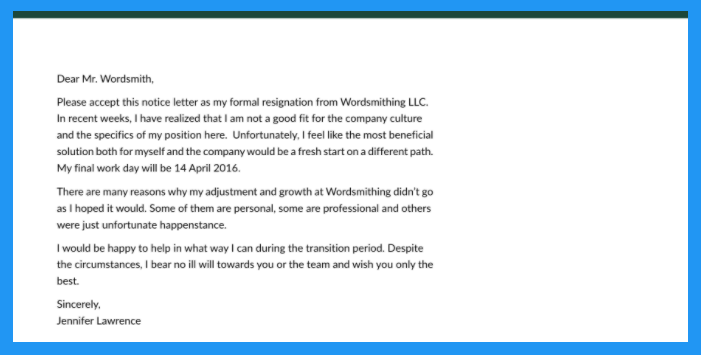
Resignation letter for unsatisfactory working conditions
There are situations where you may want to leave a company due to unsatisfactory working conditions. Still, you need to keep your resignation letter level-headed and professional. Here’s an example of how to voice your concerns about working conditions in a resignation letter, while maintaining a respectful tone:
Dear Ms. Hemsworth,
I take no pleasure in sending you this letter, but at this stage I feel it is a necessary step, however unfortunate the situation may be.
My starting period with Frostberry LLC has been generally positive, yet within recent months the department, team and company in general have taken a direction with which I do not agree. The methods, working conditions and overall atmosphere have been (in my opinion) counterproductive and not conducive to quality work, employee happiness or psychological well-being.
I regret to inform you that my last working day will be Dec. 2, 2021. I wish you and the Frostberry team success and fulfillment. I am prepared to help with the transition period to the best of my ability.
Sincerely,
Melinda Hawke
How to write a bad resignation letter
People sometimes wonder how to write a “bad” resignation letter. “How should I write a resignation letter for a job I hate?” “Can I write a negative resignation letter?” The advice we will provide a thousand times over is this: No matter how bad your experience gets, keeping a cool head will benefit you in the long run. The examples in the chapters above are decent guidelines on how to not make a bad situation worse.
But if you feel like writing a negative resignation letter, simply ignore all the advice provided above! Strike a disrespectful tone, blame the company for your departure, and be sure to insult the boss personally!
If you like your career advice illustrated, take a look at the advice of WikiHow on writing resignation letters, which puts a big red “X” next to the line “I quit. I’ve had enough.”
Here’s an example of a negative resignation letter that we hope you will never actually use, even if you suddenly become a Bitcoin millionaire:
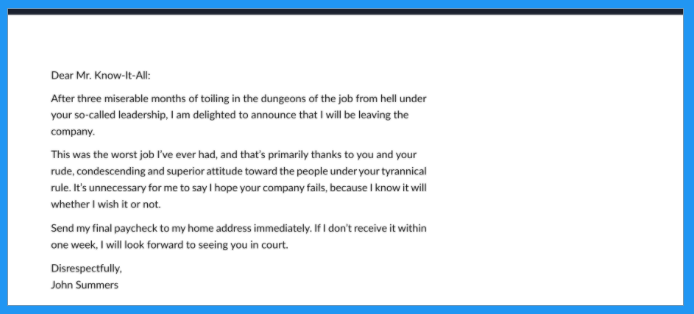
But in all seriousness, please don’t send a letter like this, however tempting it may be. The momentary satisfaction gained won’t be worth the long-term fallout. Life is unpredictable and karma IS a thing.
Is it OK to resign by email?
It would call for extraordinary circumstances if you were to suddenly resign by email with no prior notice to your boss in person, or at least by phone.
But under more normal circumstances, if you’ve already dropped the news in person, there’s usually no reason why you couldn’t send a formal resignation letter by email. We do live in the 21st century. If the company needs a written record of your resignation letter to put in a file cabinet, that’s what the “Print” button is for.
However, if and when you defuse the news to your boss in person, it can’t hurt to ask whether s/he would like you to follow up with a formal letter of resignation on paper, or whether an email will suffice.
Can I handwrite a two-week notice? If your departure is not entirely amicable, it might be tempting to scribble your two-week notice on a piece of paper and consider it a done deal. In reality, the traceability and formal nature of sending the notice over email is the only way forward. You might feel like resigning over a WhatsApp message, but again, think about your future prospects and take the extra 10 minutes to draw a line properly.
What to consider before sending your letter of resignation
This may seem painfully obvious, but before sending your letter of resignation you need to be absolutely positive that you want to leave this job and the time is right to do so.
Unless you’re wealthy enough to live for months (or God forbid years) without income, you probably know better than to quit one job before you have another. You may have stellar prospects, but unless you have an assured job offer, jumping without a net and without careful consideration is a big risk.
People have been known to take early retirement without really understanding the benefits they are due — and then they find themselves scraping by on a much smaller monthly income than they expected, possibly for the rest of their lives.
If you do have another job lined up, consider when you’re expected to start, and whether that’s negotiable. You may want to take a break for a certain amount of time between jobs, and you’re unlikely to be due a vacation at your new position anytime soon.
If you do want to take a short hiatus to re-evaluate your professional life, a good way to take stock is sitting down and composing a new resume. This will not only allow you to gather your thoughts as to the path you’ve traveled, but also help you re-imagine where you might want to go next.
Depending on both your next job and your current job, you may be able to give a month’s notice, two weeks’ notice or even zero notice. Two weeks’ notice is standard, and you should aim for this if not a longer notice period. If for some reason you’re forced to give short notice, you should be prepared to explain why.
You may also work in a job where you have access to trade secrets or other sensitive material, and you may even work for an employer that will want to terminate your employment and escort you out of the office on the day you give notice. If this is a possibility, you should be prepared to leave the job immediately and never return again.
Even in more routine job separations, you will typically lose your company email address and access to its computer networks on your final day. Without violating any laws or contractual obligations, you should back up your personal files and critical contacts so you’ll have access to them outside the company network.
Don’t tell your buddies before you tell your boss
A job departure can be big news in any company, and news has a way of getting out. So while you may be eager to confide in your friends at work that you’re going to be giving notice soon, that’s usually a bad idea. News will inevitably leak out and there is potential for your boss to be embarrassed.
You may be tempted to tell your closest buddies that you’re leaving but they can’t tell anyone. So, of course, they’ll start “confidentially” leaking this scoop to everyone else. Before you know it, the boss is going to be blindsided by news that everyone else in the department already knows.
This is not professional, and it’s not cool. Plenty of people may WANT to know about your departure, but the person who NEEDS to know is your supervisor. Hold your cards close to your vest until then.
Defuse the news to your supervisor in person
As the song says, “Breaking Up is Hard to Do” — and there’s a right way and a wrong way to do it. Hopefully you wouldn’t end a romantic relationship with a text message, and you shouldn’t treat your employer with the same discourtesy.
Knock on your boss’s door and ask if s/he has a minute. Make an appointment if necessary. Make every effort to tell your supervisor face to face that you are going to be leaving this job. This can be a scary or stressful situation, but as long as you’re sincere and honest, nobody will judge you. Stay positive and friendly.
If for some reason a meeting is impossible, a phone call is probably your second-best option. If this is not an option either, consider writing an email that says you need to talk about an urgent matter, either in person or by phone.
Don't let your emotions cloud your resignation letter. No matter what the circumstances of your resignation, your are likely to be in a heightened emotional state when you write your resignation letter. You need to find calm and professionals words to write your letter, so try to find a neutral mental headspace if at all possible. Go for a walk to clear your head before your write it - how you leave your job really does matter.
Have your letter of resignation ready
Before you inform your boss of your pending departure, you should have your formal letter of resignation ready. In fact, you may want to print it out, sign it, put it in an envelope and hand it over in person when you break the news.
Alternatively, you may need to be prepared to email your letter right after this meeting. If time is of the essence — for example, if you need to deliver your two weeks’ notice today — this will fulfill that obligation right away.
You may want to ask your supervisor if you should inform other higher-ups of your departure, such as the HR Department or the office manager. Depending on your situation, you might also want to ask whether it’s OK to tell your coworkers at this time that you’re leaving.
Explaining your reasons (or not)
Your boss, other team members and even your favorite cafeteria lady will probably be wondering why you are leaving. It’s a natural question, and you’re going to need to formulate some kind of answer just to satisfy the simple human curiosity of the people around you. But you don’t necessarily have to state your reasons in your resignation letter.
You may have a simple explanation that anyone could understand:
- You’re nine months pregnant, and you want to be home with your newborn daughter during her formative early years.
- You’ve always wanted to earn a postgraduate college degree, and now you have the means to pursue it full-time.
- You’ve been offered a fellowship that involves trekking around the world for a year, and this opportunity won’t knock twice.
- You’re pushing 60, you’ve been saving money all your life, you just bought a new sailboat, and Tahiti beckons.
If you have a totally understandable reason for leaving that won’t offend anyone, there’s no reason not to spell it out in your resignation letter. That doesn’t mean you have to, but there’s no reason you can’t.
However, it’s not always a good idea to provide a reason for your departure in your resignation letter. In some situations, you’re better off with a quiet and graceful exit. Yet your coworkers and, most importantly, your boss will still have questions. You should be prepared to provide some sort of response, even if you don’t want to reveal your true reasons.
If your reasons are sensitive — for example, if you’re upset with the way you’ve been treated by the company — it’s probably best to discuss this delicately in person, if at all. A private conversation will not become a part of any permanent record, but your resignation letter will.
What to do after giving your two weeks’ notice
Once you’ve given your boss two weeks’ notice, you can presumably tell your buddies. If you’re widely known within a fairly large company, you may want to compose an email to all your colleagues announcing your departure. Or it may be a better idea to tell people individually, whether in person or by email. But again, resist the urge to criticize the company in writing in any way.
Remember that your company phone and email will probably be cut off soon, so if you want colleagues to be able to contact you in the future, let them know how they can do so.
In some companies, the boss may want to be the first to let the staff know of your departure. If so, don’t beat your supervisor to the punch with a mass email of your own. You may need to meet with the HR Department to discuss any outstanding issues, including pay, vacation, health insurance and retirement. It is best to get these details ironed out before you tell anyone else.
If you’re in possession of a company laptop or any other equipment, be sure to return it before you depart. And if you’ve used this equipment for personal purposes, you may want to scrub it first of any files that aren’t work-related.
You may be stricken with “short-timer’s syndrome,” where you’re tempted to coast to the finish line without doing much work. But if you resist this temptation and continue to work conscientiously until your last day, you will leave a great impression on your soon-to-be former employer.
Finally, if you work at a company that has going-away parties, the last thing you may need to do is make some gracious statements to the staff on your last day of work. Follow all of this advice, and you can walk away from the job with your head held high, your bridges unburned and your prospects for the future undiminished.
Key Takeaways
A thoughtful resignation letter is the bookend to your time with an employer. The contents should touch on both the professional and personal aspects of your departure, with appropriate emotions. Cover the formalities in the first part of the letter of resignation and explore any appropriate feelings towards the end.
- Remember that your departure may not be considered formal without a resignation letter.
- Share the date that you are leaving, gratitude for the opportunity and willingness to help with transition.
- Keep the resignation letter to 2-3 paragraphs - send it by email as an attachment to HR and your old boss.
- Ideally tell your boss in person before sending them the letter - they may be more shocked than you think.
- Don't criticize the company or use the resignation letter to settle scores - keep it classy.
Once you have written an effective letter of resignation, you can look forward to what comes next!






